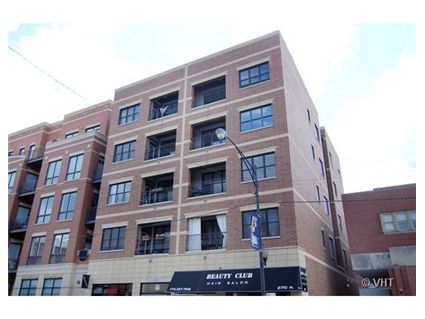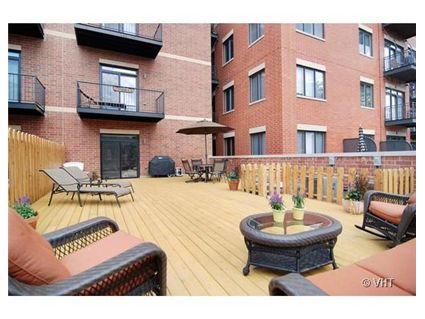Sold Less than a Year Ago: 2708 N. Halsted
What happens when you have to sell in under a year during a slow market?

A seller in 2708 N. Halsted on the Lincoln Park/Lakeview border is about to find out. The eight unit building was completed in 2007.







Unit #2S: 3 bedrooms, 2 baths, 1900 square feet
- Sold in August 2007 for $640,000
- Currently listed for $699,500 (parking included)
- 960 square foot deck
- Diningroom
- Assessments of $118 a month
- Sudler Sotheby’s has the listing
This seller doesn’t seem too motivated, if they’re holding out for a 9% profit.
I walk by this building all the time and have for years. Its endemic of the bubble: beautiful empty buildings.
Don’t be fooled by the staging and paint work (which is admittedly nice): nobody has likely lived in this unit. Beautiful empty buildings..
Beautiful place, really, and one of the few newer places I’ve seen that I actually like.
But it is doubtful it will sell for more than 85% of the 2007 price, which is not due to any flaw so much as the condition of the housing and credit markets.
This bust will be another 2 years playing out, at least.
General Question about Interest Rates:
I am looking to be a first time buyer and am a firm believer that real estate prices will drop in the next couple of years due to pure economics. Does anyone believe that real estate interest rates will rise over the next years? Based on the monthly payments alone, any savings on the reduction of home real estate prices could be completely offset by increasing interest rates. I want to wait, but the thought of rates rising above 8% to combat inflation is troubling.
Any thoughts would be greatly appreciated!
You could buy some interest rate swaps.
Home prices would likely decrease in the face of oppressive interest rates so interest rate risk has not been my greatest concern.
AD,
Rates will increase over time and this will put downward pressure on prices. However I am not sure they will go to 8%. The Fed will be very reluctant to increase rates significantly as they realize that would blow down the house of cards thats holding up the housing market currently.
However, would you rather your monthly payment comprised of more interest and less principal of a lower priced asset (which is tax deductible) or less interest and more principal of a higher priced asset (which is not)? With mortgages there is no prohibition on refinancing so I’d rather buy in higher interest rate times when prices are low, then refi when rates are lower.
Remember that assessed taxes and homeowners insurance are also loosely determined by nominal property values.
Dave,
Interest rate swaps are an OTC derivative market and not open to individual buyers and sellers, heck they’re not even open to smaller banks. No trading institution would assume the counterparty risk of a single person. Well unless their last name was Gates or Buffett. 😀
I am a newbie, and wondering how to get the historical price info? Thanks a lot.
Yep, we’ll see if the money evaporating from the bursting credit bubble counteracts the inflationary effects of commodities. But any substantial increase in borrowing costs (such as interest rates) would have a rather direct impact on real estate prices.
Bob’s ideal of buying in a low-price, high-rate time just before rates are drastically cut is a good one, but of course very hard to predict.
Ultimately, I think your concern should be on buying when the so-called “fundamentals” of the market seem right to you and you feel comfortable with the monthly payment you’d be locking yourself into. If -real- housing price collapse to the point where they are decreasing over the long term, then (1) it may be the least of your problems, since such a slide would indicate some serious economic contraction, and (2) you’d have to question if its wise to invest in that location in the first place. Put another way, I’m sure glad I wasn’t saving up to buy a house in Englewood or Detroit in 1947. Put yet another way: if the market is only going down, be careful about where you invest your money.
Nice $5k(+?) refrigerator.
I actually was looking at this unit on the MLS just yesterday and thinking it was priced high. Condos in Lakeview are priced all over the map in my opinion – i.e. if you just spend a little time looking around you can get a lot more for your money. I’m actually going to spend more time over the next two weeks trying to highlight some of the striking disparities.
Regarding interest rates…they have already risen 60 basis points, which translates to a 6.6% increase in monthly payment. With inflation rearing its ugly head I would think that there is a real likelihood of longer rates rising further still. Bond holders don’t want to be stuck with a negative return.
Re: AD’s Q on interest rate forecasts.
My 1 cent nonbinding forecast is that the US will have a multiyear no-growth recession/deleveraging catharsis as high commodity prices/falling home equity/increased jobless crush consumer spending.
For one possible scenario, see
http://www.minyanville.com/articles/GS-Bernanke-Fed-Credit-xom-economy/index/a/17804
If this is the case, then interest rates will be low for a long time and I might even recommend a **gasp** 5-year fixed/ARM mortgage.
Sorry to be so pessimistic. YMMV.
Just like what Bob said interest rate swaps are not available but you can hedge by buying Treasury contracts or LIBOR contracts in the futures market. However, the risk to capital might be too great for most tastes.
This is a bit traditional for my tastes, but I like the pics well enough that I would actually consider buying it if the price were at all reasonable. The price should be at or less than the price a year ago.
“I am a newbie, and wondering how to get the historical price info? Thanks a lot.”
There are numerous places where you can get sales data including some of the realtor websites like Rubloff. The Chicago Tribune also has sales data going back about 10 years.
Wow some people on here are pretty intense! You’re recommending buying treasuries and LIBOR futures contract to hedge against future rate hikes even though the guy doesn’t have a mortgage. When I refinanced my private student loans I was nerdy enough to compare the LIBOR to the Fed Fund rate and I went as far as researching the prices of eurodollar contracts to determine if the market though rates were going to jump and by how much. I told a handful of other people about this and these are professional people, and they stared at me like I was from outer space…
(but if you really wanted to know, I refinanced at the 3-month libor plus a very small margin. I have private student loans rates in the 4’s. Not bad for an unsecured loan, huh? Thank goodness I locked in my low rate BEFORE the auction system broke down because now private consolidations on the cheap are difficult to come by. A few weeks ago I tried to show a guy at work how to refinance his loans at my low rate and guess what? My lender and along with most banks are no longer offering private consolidations! Think about that – the credit crisis virtually shut down the private student loan refinance market! Too bad for those stuck with private loan interest rates in the 9’s and 10’s!)
Interest rate swaps are available to individuals….you just have to be a PWM client (and are probably not a first time home buyer). The student loan market was hammered this past year. A lot of grad school students have been scrambling lately.
We’ll see what the ECB does with their rates coming up. That will have a lot to do with commodity prices, treasury prices, the dollar’s value, future fed funds rate expectations and potential stagflation.
That is a pretty good staging job if no one has ever lived there. I’ll be curious to see what happens with this place 8 mos from now.
Interest rate round up. Don’t listen to blogs for advise, simply look to the bond market. The bond market shows little of inflation concerns. 30 year fixed is back at 6.25% and the 5/1 ARM at 5.25%. Nothing to worry about here…
Stevo:
Don’t just cite rates for conforming loans–it’s misleading given what you talk about. You don’t use them, they aren’t reasonable for the market you cover. What’s a Jumbo running this week?
I wonder how soon they will wait until they start the price reductions.
Homedelete, yeah, i guess you get that sort of looks if you “over analyze” and figure out the best option. Most of the time, it doesn’t make a significant difference but for me, gives me a sense of security in making decisions.
Regarding economic outlook:
I believe that Jean Claude Trichet will raise the ECB rates to prevent inflation while Bernake will pump as much cash into the street in hopes of credit market unfreezing. Even China and BOJ will hike their rates to curb inflation that cannot be stopped. We are in a stagflation, like it or not. We moved from recession in late 2007 into stagflation stage due to weak dollar and higher commodities prices.
Back to econ 101, can pull a string but can’t push a string, can take the horse to water, but horse is one who drinks. This credit crisis will not be solved by mere tinkering of monetary and fiscal policy. We played ponzi with the relative value of our economy and wealth and its time to pay up. Take a big bath and change our consumption rate and increase our savings rate from negative into reasonable rate. Since Ricardo was always right, with free trade, the dollar will stabilize and we will sell enough of our goods and services to offset our deficit that we have ran for a long time.
I am usually against government bailouts, but I think that the government should take business away from the banks mortgage securitization by competing against it. Packaging the mortgages with government guarantees ala higher rate for the borrowers and lower rates for the investors, the credit spread should be funneled back into reducing our bloated debt. This also violates my personal belief that government is inefficient, hence another pipe dream.
Rates have been increasing and pegged to the London rate, the FED has NO control on mortgage rates. The ECB raised their rates last week. Interest rates will be going up probably to 8%.
SO all the people waiting for a lower price will pay more interest. Maybe it will balance out, but most of the times higher rates over 5 years and esp over the life of a loan will negate saving another 10g or so on price.
The market is all about mentality. When prices were going up people were bidding them higher now people are bidding them lower.
Also Chicago never saw crazy appreciation like FL, CA, AZ. Yet we are in the same boat.
PS Prices if you have not noticed have not fallen much in Chicago anyways, sales are down by 1/3-1/2 though
PA – Where are we going to get 8% interest rates from? a 30 year fixed is sitting at 6.25%, ROUGHLY THE SAME PLACE IT HAS BEEN FOR THE PAST 2 YEARS.
ARM rates are almost certainly going to 8% — they are generally tied to LIBOR, which mimics the ECB and Fed rates fairly well. That will badly hurt current owners, but not do too much to new buyers.
Fixed rates generally follow 10-year treasuries — those bonds are at the absurdly low summer 2002 through late 2005 levels (4%). This is about a point below the 2006-7 level and much further below pre-2002 (6% in 1990s, 8% in late 1980s, don’t ask before that…).
If the economy is actually going into freefall, the associated deflation should drag down t-bill rates. If the economy is instead only stagnating, the current commodity price inflation should spread and drive up general inflation (and t-bill rates). It looks to me like we are going into a sufficiently bad patch to affect even 10-year bonds (although 30-year should be okay), but the direction seems indeterminate.
Steve,
Not being contentious here but have you seen those 30yr Jumbos, WOW that market no longer exists. Fannie and Freddie are getting really scary now also. I have a closing for Aug 1 and just hold my breath everyday that we get there without this all falling apart.
With Countrywide, IndyMac, and a bunch of other major lenders now doing nothing more than servicing and originating conforming loans the jumbo market is dead for a while. The conforming market itself has shifted by about 1% since mid-May, and will be incredibly badly hurt if either Freddie or Fannie get downgraded.
Today’s IndyMac news is at http://theimbreport.com/?p=161
Freddie and Fannie are exposed to some serious accounting risk (FASB is reportedly killing QSPEs when it revises FAS 140), which could dramatically change their balance sheets for the worse.
This generic cookie-cutter McCondo is not going to fetch any sort of premium. If these bozos don’t get serious about cutting this price, it will sit for a long time.
I hate that you guys make me look like a housing bull defending Steven yet again but let me point out some things first, then I will throw off this bullish(it?) overcoat:
30 year and even 10-year yields are still well above what they were in March. Yeah nothing makes Wall st more worried than watching one of their competitors bleed out on the street (30yr treasuries at below 4.1% 3/2008). Mortgages are still tied to 10-yr notes and I hear you. Yields on those were still lower then.
Kevin are ARMs really going to rise that much now that the US banks have been discussing the creation of their own _fake_ ‘LIBOR’ index? One in which US banks are satisfied its authentic? I mean George Michael music and eurotrash vinyl jean’s aside and all. Option ARMs will cause the next wave of writedowns I agree.
IndyMac is nothing more than the Alt-A version of New Century. Yes it is toast 15 months later. They are an inconsequential participant.
Fannie and Freddie however aren’t inconsequential. If the gov’t allows Fannie or Freddie’s bondholder’s to go kaput then folks we are in for one helluva show. And an exciting one too if your money’s in play.
I have a 5/1 arm (Jumbo) at 5.875%. It is not that bad!
Money never really disappears, it just changes hands. Do you think financing a JUMBO today at 5.875% is better or worse than financing a Jumbo 2 years ago?
Just curious…
Look for missing equity from homeowners in the following places.
Lehman brothers stock holders who sold in 2007.
Lehman brothers ceo
Countrywide ceo
Countrywide share holders who sold in 2007
ect
ect
ect
It is not gone but just in different hands. It is called capitalism so get used to it…
Oh Steven,
So true. Before they start accusing us of being one and the same (we aren’t) let me congratulate your interlocuter skills. Keep their heads ringin’ my friend.
But money _IS_ created out of thin air via the bank multiplier set by the federal reserve. So yes money can disappear and reappear quite quickly. Its just done a lot more reappearing than disappearing in the past 15 years or so.
The money multiplier might be a great monetary stimulus tool in the short to intermediate term, but it does distort long-term reality and markets as your comment succinctly pointed out. I agree with limiting this multiplier, but I’m not in a position of power nor the government to make recommendations.
“I have a 5/1 arm (Jumbo) at 5.875%. It is not that bad!”
“Do you think financing a JUMBO today at 5.875% is better or worse than financing a Jumbo 2 years ago?”
According to the FHFB, that is *far* worse than Jumbo rates used to be. http://www.fhfb.gov/default.aspx?page=53
Table 29 reports that the average fixed jumbo had a rate of 5.88% in 2003, 5.93% in 2004, and 6.06% in 2005.
So, your 5.875% 5/1 ARM Jumbo exposes you to all the interest rate risk (after 5 years), while you could have gotten the same fixed rate a few years ago.
If memory serves, in 2003 you could get 5/1 jumbos close to 4%. I had a 3/1 conforming at about 3.5% (I was moving in two years and PITA was half of my rent).
Money may not disappear, but market value sure does!
Most of the zillions of dollars of lost market value of real estate was never realized by anyone – not even the vile executives and bankers who enabled this mess or the lucky people who got out in time.
Just like in the stock market, the market value of real estate is nothing but an estimate based on the last trade.
The aggregate hypothetical value of assets (real estate, tech stocks in January 2000, tulips in Holland, you name it) never exists to begin with, it’s just on paper (or maybe in the minds of the naive).
Isn’t there still a FASB principle about not recognizing a profit until it’s realized?
“Money never really disappears, it just changes hands.”
That is largely true of actual money, but is not true of asset values (like housing equity).
If you cashed in your equity at the peak by selling to a greater fool, you gained a lot of money while the fool (and his banker) lost it.
If you cashed in your equity at the peak by emptying a HELOC, you gained a lot of money (and associated debt) while the lender is on the other side. When you walk away, that second mortgage holder is left with nothing (unless they find a debt collector) while you still have the pile of cash.
On the other hand, if you did not cash in your equity at the peak, that value is *gone* — nobody has it. Look at unit 1314 at 2000 N Lincoln Park West. Yesterday’s Chatter explained that 1114, 1214, and 1414 all sold for about $400K in early 2005. At that point, the owner of 1314 probably believed that their property was also worth $400K. Now, 1114, 1214, and 1414 are trying to sell for prices around $240K-$275K. The owner of 1314 may well be asking “who stole $125K of my equity?”, but the truth is it never existed as money and couldn’t be stolen.
In the same way, consider the owner of a share of the South Sea company who obtained it on January 1, 1720. They would have paid about 120 pounds for a share at that point. On August 29, shares were trading for 775 pounds — this investor may have thought “I’ve made 655 pounds”, but if he failed to actually sell his share it was all an illusion. The October 1, 1720, price was 290 pounds — the investor looks a lot more poor than he did on August 29, but nobody is richer for his “pain”. (People are richer for other investors’ pain, but no one benefited from this particular investor.)
I almost went with a tulip example, but the data is more sketchy there…
Its next door to a VERY active fire station (the small building in the bottom right corner of the picture). Between that and being on Halsted close to a lot of bars I couldn’t imagine you could ever open your windows.